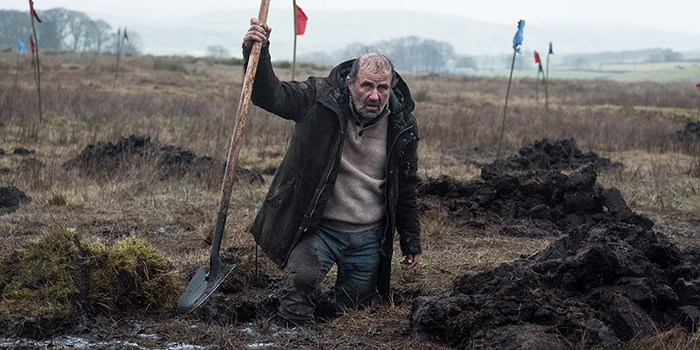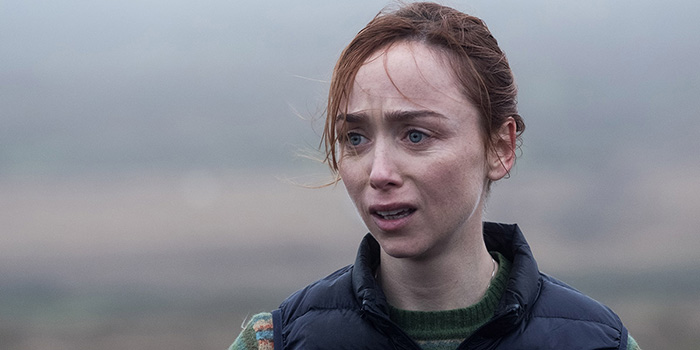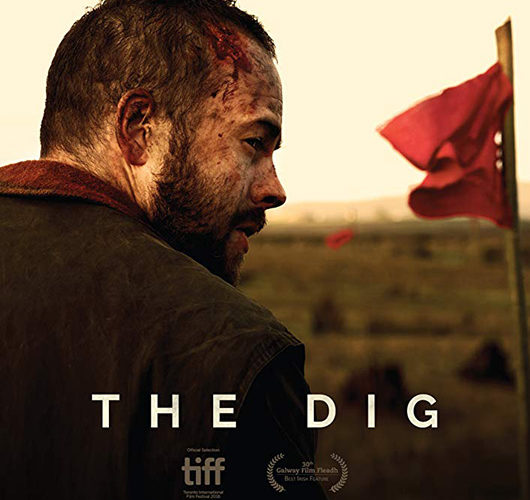After fifteen years in jail for murder, Ronan Callahan (Moe Dunford) returns home to find his victim’s father caught in a loop. Every day spent behind bars was a day Sean McKenna (Lorcan Cranitch) languished in the bog behind the Callahans’ property, digging holes along a carefully marked grid in search of his daughter’s body. He promised he wouldn’t stop until she was at rest and so he shoveled mud while his wife lay dying of cancer and still shovels mud now that his other daughter Roberta (Emily Taaffe) quit her job to make certain he didn’t die of thirst or starvation. We can therefore assume the “warm” welcome Ronan will receive upon working up the nerve to demand Sean leave. And we can guess what comes next.

The result is The Dig‘s story of redemption and forgiveness that’s as angry as it is heartfelt, written by Stuart Drennan and directed by Andy and Ryan Tohill. It sees Ronan doing the only thing a remorseful ex-convict can: make amends however possible. The easy path to do so would be telling Sean where he buried her, but he was too blackout drunk to remember. So rather than get an earful from local sheriff Murphy (Francis Magee) about how nobody cares what’s happening because in their mind Sean has more right to this makeshift burial ground than him, Ronan picks up a shovel too. Maybe the act will jog his memory. Maybe his being there will simply get the job done sooner. It’s a penance both willingly suffer.
And boy is it powerful with these two men possessing a silent yet simmering bile beneath weak attempts at civility. Their progress spans a solemn birthday, a drunken beating, and multiple devastating false alarms that accompany finding something, anything in the dirt. Roberta becomes a fixture between them that tries to get her father to come home just as hard as she tries to get answers out of her old friend (and maybe ex-boyfriend) from what seems a distant lifetime ago. The rain falls to cover everyone in mud as tempers flare to risk more violence in retribution. But with every swing of the pickaxe Ronan and Sean are numbing a pain that may never go away, this futile quest becoming the most important task of their lives.

It’s a slow burn character study hinging on their sorrow. For one to look at the other is to remind each of the pain stabbing them through the heart whenever they close their eyes. It doesn’t matter if Ronan is sorry because sorry won’t bring her back. It doesn’t matter if the locals harass him either because that vengeance does little but empower men who are too embarrassed to admit they couldn’t stop this tragedy before it happened. So we watch them dig and dig and dig. We look into Sean’s sad eyes and understand why it’s impossible for him to stop no matter how hard Roberta wishes when asking. And we know Ronan’s promise to never stop isn’t one his soul could ever make lightly.
If the filmmakers drew a line at this introspective look at grief, The Dig would be an absolute gem. For some reason, however, they didn’t believe this aching drama was enough to sustain itself despite finding it could do exactly that for three-quarters of the runtime. You can leave a question open at the start and work your way towards answering it, but don’t let us think everything we’re told is truth only to pull a rug out from under us without warning. I was completely invested in this journey and all that Ronan, Sean, and Roberta were learning along the way precisely because it was built upon unalienable facts. This film was about the difficulty of coping one second and a ham-fisted murder mystery the next.

What’s worse is that the curveball thrown is quickly neutralized so the denouement’s perfectly crafted ending is tainted in the aftermath. Rather than trust what they were making, Drennan and the Tohills fall prey to excess for no other reason than shock value. It doesn’t therefore matter if it smartly pieces its answer together because we never actually asked the question. They never hinted we should. So all the emotion earned by an intensely poignant representation of authentically complicated catharsis is erased in a single pulpy instant. And while they might be telling themselves they did it for our benefit and entertainment, it was really for their own. They wanted some memorable flair without realizing it was already unforgettable precisely because it had thus far ignored that impulse.
It’s an unforgiveable misstep within an otherwise fantastic film. Dunford and Cranitch are devastatingly good in their roles, anguish etched upon their faces. Their dynamic is honest too in how Sean grows to appreciate what Ronan is doing despite it being his fault they’re in the swamp. There’s room for this father to find humanity within his daughter’s murderer even if the slightest sign of her makes his blood boil enough to smack him upside the head with his shovel. Compassion and pure hatred don’t have to be mutually exclusive and the Tohills do very well to prove exactly that. I only wish this quietly complex truth was enough for them to let unfold devoid of any desire for unwarranted flash. It was so good until it wasn’t.
The Dig screened at the Toronto International Film Festival.

